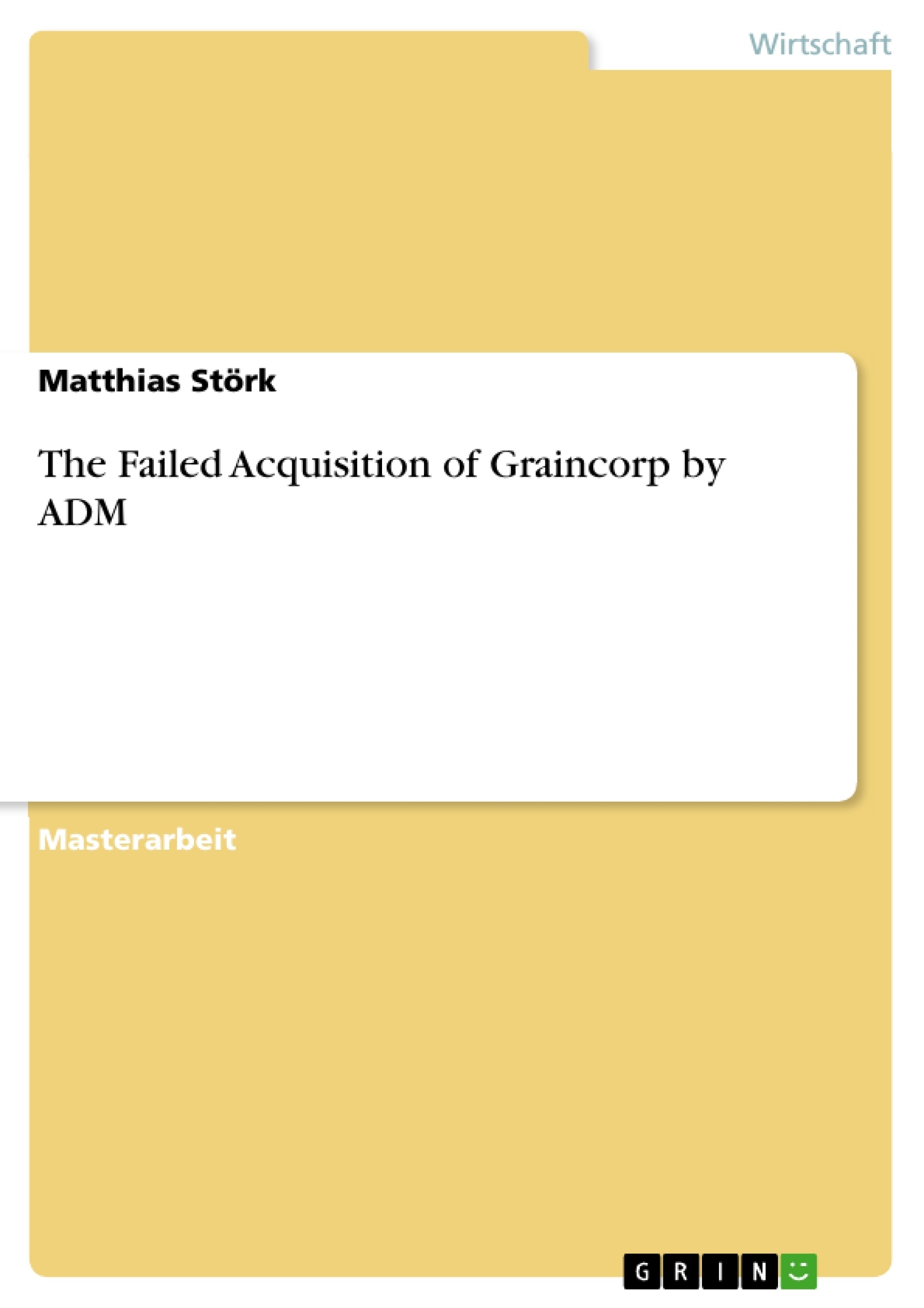At the top of a merger wave in the agriculture industry, Archer Daniels Midland (ADM) made an unsolicited offer to the board of GrainCorp, an Australian grain handling and processing company. The rejection of this first offer by GrainCorp’s board induced ADM to make a second bid, which also got rejected. Six months later, on 26 April 2013, the two companies entered into an implementation deed and GrainCorp’s board backed ADM’s third offer, which included a 49% premium over the last closing price before the bid announcement (ADM 2013a). However, seven months later, the Foreign Investment Revision Board (FIRB), under the leadership of Treasury Secretary Joe Hockey, rejected the takeover on national interest grounds (Hockey 2013).
This master thesis aims to give a comprehensive analysis of this rejected transaction with a focus on three research questions. The first question is whether the strategic rationale behind the takeover did make sense economically. The second question concerns the fairness of the offer price that GrainCorp shareholders would have received, while the third question examines the stock market reaction of GrainCorp, ADM, and their competitors.
To determine the strategic fit of GrainCorp for ADM, this thesis analyzes both companies and the industry in which they operate, using publicly available information provided by the companies themselves and other sources such as analyst reports.
The fairness of the offer is determined both via a multiple valuation and via a discounted cash flow (DCF) valuation. Both valuation methods are conducted from an ex ante view and the valuation date is the 19 October 2012, which is the last trading day before the offer announcement. The multiple valuation can be divided into trading multiples and transaction multiples. All required data about share prices as well as income statement and balance sheet items for the trading multiples is retrieved from Bloomberg and cross-checked with data from published annual reports. For the calculation of the forward multiples, Bloom-berg’s “BEst” median consensus of broker estimates is used. The calculated multiples are all adjusted for the value of management options, operating leases, extraordinary items, and cross-holdings to ensure the comparability between firms. The data on historical transactions in the agricultural sector is taken from Thomson Reuter’s SDC Platinum database. [...]
Inhaltsverzeichnis
- 1. Introduction
- 2. Deal Description
- 2.1 Timeline of Events
- 2.2 Company Analysis
- 2.2.1 GrainCorp
- 2.2.2 ADM
- 2.3 Industry Analysis
- 2.3.1 Overview
- 2.3.2 Supply & Demand
- 2.3.3 Grain Handling
- 2.3.4 Grain Trading
- 2.3.5 Malting
- 2.3.6 Oilseed Processing
- 2.4 Strategic rationale
- 3. Multiple Valuation
- 3.1 Trading Multiples
- 3.1.1 Calculation of Multiples
- 3.1.2 Discussion of Results
- 3.2 Transaction Multiples
- 3.1 Trading Multiples
- 4. DCF Valuation
- 4.1 Financial Forecast
- 4.1.1 Segments
- 4.1.2 Other Income Statement and Balance Sheet Items
- 4.2 Weighted Average Cost of Capital
- 4.2.1 Cost of Equity
- 4.2.2 Cost of Debt
- 4.3 Value of Franking Credits
- 4.4 Synergies
- 4.5 Calculations and Discussion of Results
- 4.1 Financial Forecast
- 5. Event Study
- 5.1 Event Study Set-Up
- 5.2 Discussion of Results
- 6. Conclusion
Zielsetzung und Themenschwerpunkte
Die Masterarbeit befasst sich mit der gescheiterten Übernahme von GrainCorp durch ADM. Ziel ist es, die Hintergründe der Übernahme und die Gründe für das Scheitern zu analysieren. Dazu werden die Unternehmen und die Branche untersucht, die strategischen Beweggründe der Übernahme betrachtet und verschiedene Bewertungsmethoden angewendet.
- Analyse der Übernahme und ihrer Hintergründe
- Bewertung der beteiligten Unternehmen
- Untersuchung der strategischen Beweggründe
- Anwendung von Bewertungsmethoden
- Analyse des Scheiterns der Übernahme
Zusammenfassung der Kapitel
Das erste Kapitel führt in das Thema ein und stellt die Relevanz der Übernahme dar. Kapitel 2 beschreibt die Übernahme im Detail, inklusive der beteiligten Unternehmen, der Branche und der strategischen Beweggründe. Kapitel 3 und 4 befassen sich mit der Bewertung von GrainCorp mittels verschiedener Methoden, wie Trading Multiples, Transaction Multiples und DCF Valuation. Kapitel 5 analysiert die Auswirkungen der Übernahme auf den Aktienkurs von GrainCorp mithilfe einer Event Study. Das letzte Kapitel fasst die Ergebnisse zusammen und zieht Schlussfolgerungen.
Schlüsselwörter
GrainCorp, ADM, Übernahme, gescheiterte Übernahme, Bewertung, Trading Multiples, Transaction Multiples, DCF Valuation, Event Study, Agrarindustrie, Getreidehandel, Australien, USA.
- Quote paper
- Matthias Störk (Author), 2014, The Failed Acquisition of Graincorp by ADM, Munich, GRIN Verlag, https://www.grin.com/document/300663




